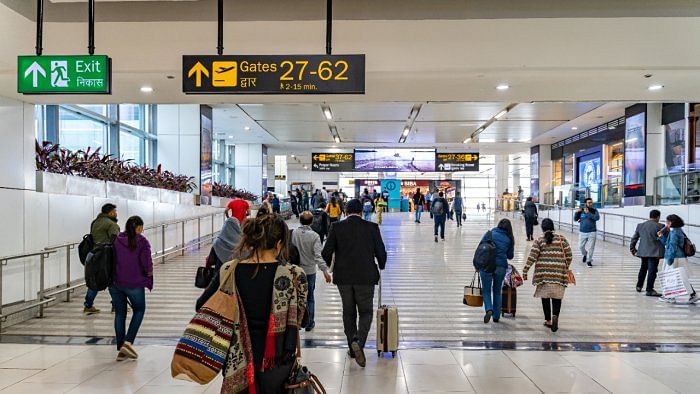
India on Thursday decided to randomly test two per cent of incoming international passengers to keep a tab on the entry of any new SARS-CoV-2 variant as one such variant of the pandemic-causing virus rips through China overwhelming the healthcare system in the communist country.
Following a review meeting chaired by Prime Minister Narendra Modi, Union Health Secretary Rajesh Bhushan wrote to his Civil Aviation counterpart Rajiv Bansal, asking the ministry to start the screening from Saturday (December 24) with support from the Airport Authority of India and Airport Health Offices.
"A sub-section of 2 per cent of the total passengers in the flight shall undergo random post-arrival testing at the airport on arrival. Such travellers in each flight shall be identified by the concerned airlines (preferably from different countries)," Bhusan wrote.
Also Read | Karnataka makes masks mandatory in closed spaces
The travellers are free to leave the airport after giving the samples. If the samples turn out to be positive, they would have to be sent to the INSACOG laboratories for genome sequencing, the Health Ministry says in its updated guideline for international passengers.
The decision on the random testing was announced soon after the review meeting in which the Prime Minister asked the officials to increase the level of testing and genetic sequencing besides keeping the Covid fighting machinery fully ready at all levels.
Modi also advised the states to audit Covid-specific facilities to ensure operational readiness of hospital Infrastructure including oxygen cylinders and PSA (pressure swing adsorption plants that generate medical grade oxygen) units, ventilators and human resources.
Union Health Minister Mansukh Mandaviya said in the Rajya Sabha that he took stock of the oxygen situation in hospitals every 15 days to ensure all the PSA plants remained operational at the time of a crisis.
The Prime Minister asked the officials to ramp up testing and genomic sequencing. States have been advised to share more samples with the designated INSACOG Genome Sequencing Laboratories (lGSLs) daily for the timely detection of newer variants.
While the government didn’t take a decision on the return of universal masking, Modi encouraged everyone to wear the mask, particularly in crowded places.
Given the upcoming festive season, the Prime Minister appealed to everyone to wear masks in crowded public places. He also urged that precaution doses might be encouraged especially for vulnerable and elderly populations.
Mandaviya said states should ensure increasing the coverage of precaution doses for Covid-19 vaccination and awareness drives were needed to be undertaken within the community.
While more than 90 per cent of India’s eligible population has been covered with two doses of the vaccine, only 28 per cent received the precautionary third dose (22.5 crore) so far. In Delhi, only 24 per cent of the eligible population has taken the third dose.
The experts have advised the third dose, particularly for the vulnerable group, since the vaccine-derived immunity starts to wane after a few months. But they also pointed out that the Chinese situation should not be compared with India as the Chinese population lacked hybrid immunity due to the administration’s “Zero-Covid” policy.
"China has low natural immunity due to its zero-Covid policy, and low vaccine immunity since they received the second vaccine dose a long time back. China has administered fewer third doses and mostly killed virus vaccines. It also has high elderly population, and less healthcare infrastructure per unit of the population compared with rich nations," said Anurag Agrawal, dean, of BioSciences and Health Research, Trivedi School of BioSciences, Ashoka University.
"Together, this constitutes perfect storm conditions for rapidly transmitting and immunity-breaking Omicron variants."